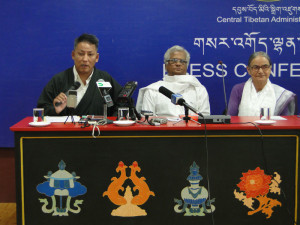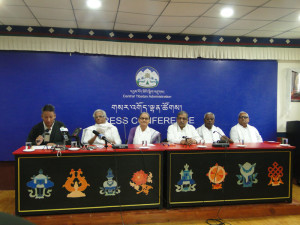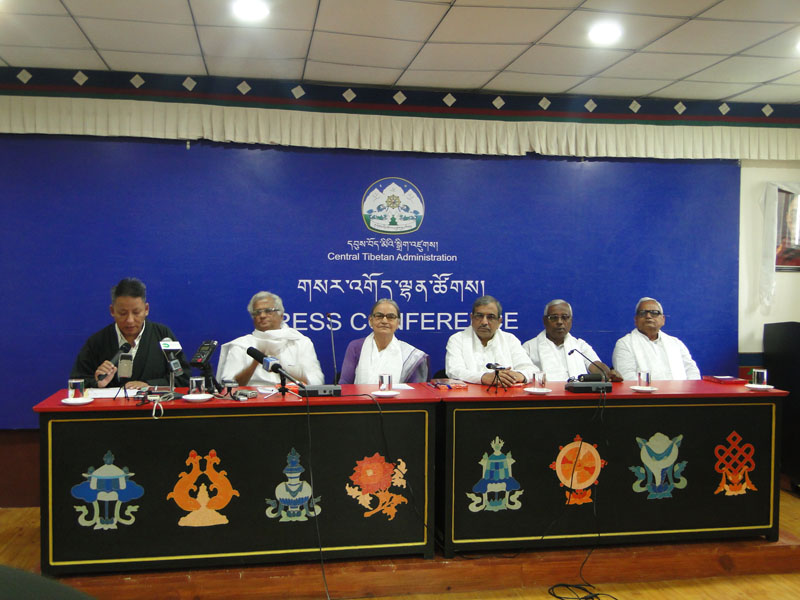Seeking autonomy from China shows Dalai Lama’s compassion: Gandhi Peace Foundation
DHARAMSALA, Sep 19: Seeking autonomy from the Chinese government exemplifies His Holiness the Dalai Lama’s compassionate nature, said Ms Radha Bhatt, Chairperson of Gandhi Peace Foundation during a brief press conference held on Sep 18 in Dharamsala.
She was answering to a question by a Tibetan reporter who asked whether the Tibetan struggle is moving in the opposite direction by choosing autonomy over independence as compared to Gandhiji’s change of stance from Swaraj (self rule) to Purn Swaraj (complete self rule/independence) during the Indian struggle for freedom from the British Empire.

Secretary of the group, Mr Kumar Prashant said he would rather call seeking autonomy a gradual progress and not moving in the opposite direction for it is an effective strategy in a non-violent struggle.
Another member of the delegation said that seeking Purn Swaraj is beyond political freedom, that the most important aspect of Swaraj is self rule. Explaining further he said: “That is where there is a big convergence between His Holiness and Gandhiji. And that is how both the traditions of the generations that we see draw from the common pool of this self correction, self discipline. Unless and until we have control over ourselves political swaraj is incomplete. Even Gandhiji said, ‘Purn swaraj is too far away and that is why I am talking about Swaraj’. Stepping down from the demand for freedom to autonomy could be termed an effective strategy of a non-violent struggle. But the main message is that of Purn Swaraj. The message that needs to be sent to our new generation is how do we make ourselves self-disciplined, self-ruled. Swaraj is self rule and from there, you go to autonomy and political freedom. Once you have self rule, no power can stop you from gaining freedom. This is where His Holiness and Gandhiji converge.”
Addressing the gathering, Ms Radha Bhatt introduced Gandhi Peace Foundation, its relation with the cause of Tibet and highlighted the support rendered by the great Indian leader, Jaya Prakash Narayan. She also expressed concern over the self-immolations inside Tibet and promised future support to the Tibetan cause.
In his address, Secretary Kumar Prashant highlighted the contributions made by Jawaharlal Nehru and Jaya Prakash Narayan in providing a safe haven to Tibetans in India during the initial days in exile, which he called the ‘J-factor’.

“Jawaharlal Nehru was the main person who gave all the moral and political support to Tibetans and Jaya Prakash Narayan symbolizes the support provided by the people of India. The triangle formed between Jawaharlal Nerhu, J P Narayan and His Holiness the Dalai Lama is very important to India-Tibet relations and we consider it very precious. His Holiness is the spiritual leader of the Tibetan people but we consider him as a spiritual leader of India because His Holiness’ name comes foremost among persons who have advanced non-violence in this world after the passing away of Mahatma Gandhi. The Gandhi family (followers of Gandhi’s philosophy) has always stood by the side of Tibet. At a time when no one took a stand on Tibet, J P Narayan organized an international conference on Tibet in Delhi and he declared that Tibet’s freedom is an integral part of the freedom of India,” he said.
Calling Tibet issue a ‘test case’ of Indian tradition and civilization, he said:
“Tibet is a ‘test case’ for the political freedom of India and spiritual maturity of India. We consider Tibet as an important issue not only because of the political fight between Tibet and India but a spiritual test case of Indian tradition and Indian civilization. The Gandhians and the people of India will stand by Tibet until Tibet achieves autonomous freedom which His Holiness is seeking from the Chinese government.”
“I would like to tell all the Tibetans inside and outside Tibet that freedom is priceless. No price is high enough to achieve freedom. Therefore I would like to extend my appreciation to the price that Tibetans have paid for Tibet’s freedom until now and I would also like to state that if we want the Tibetan freedom struggle to continue, we should be prepared to sacrifice even more to keep the struggle going,” he added.
He also urged the Indian government and the Parliament to hold a special session in the Indian Parliament on the issue of Tibet with both Indian Prime Minister Narendra Modi and His Holiness addressing the session.
“I would like to appeal the government and the Parliament of India to hold a special session in the Indian Parliament on the issue of Tibet and would like both Indian Prime Minister Narendra Modi and His Holiness to address the session. We are committed to the Tibetan struggle but we have to reiterate that commitment again and again. As a spiritual leader of India, His Holiness has the full right to tell the Indian Parliament his expectations from the Indian Parliament what role he wants the Indian Parliament to play,” he said.
Led by Ms Radha Bhatt the delegation from Gandhi Peace Foundation is on a rare visit to Dharamsala to express solidarity with the Tibetan struggle for freedom through non-violence.
The delegation attended the ongoing 10th session of the 15th Tibetan Parliament-in-exile as an observer and held discussion on the issue of Tibet with Sikyong Dr Lobsang Sangay and members of the Kashag over lunch.
They also met former Tibetan Prime Minister and scholar, Professor Samdhong Rinpoche.
Mr Karma Yeshi, standing committee member of the Tibetan Parliament who introduced the delegates to the media said the delegates will hold discussions with various Tibetan NGOs in Dharamsala after the press conference and will also discuss Tibet issue with the standing committee members of the Tibetan Parliament-in-exile led by Speaker Penpa Tsering.





